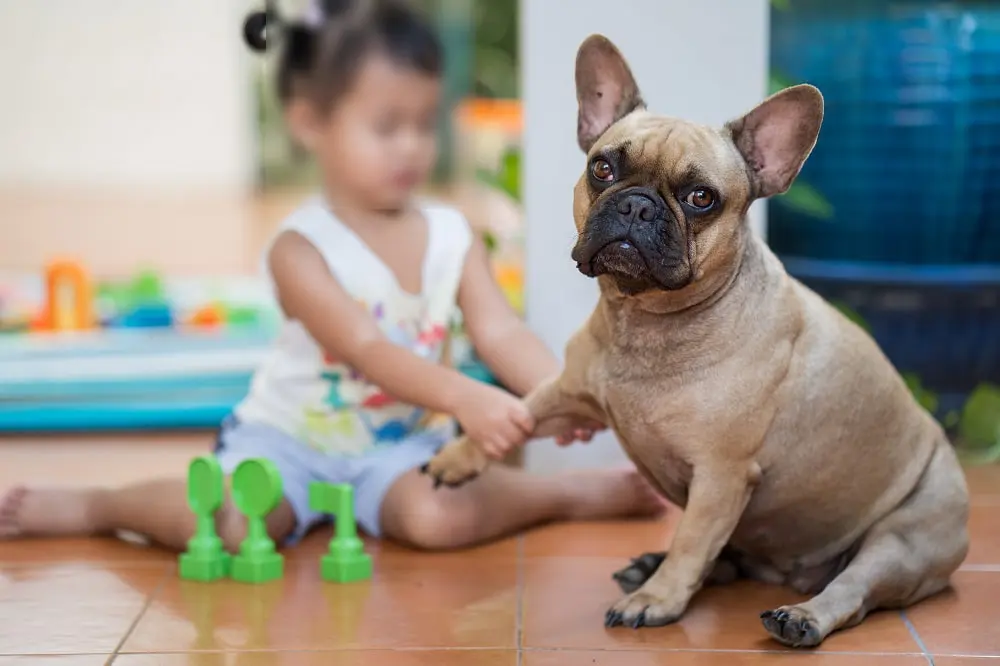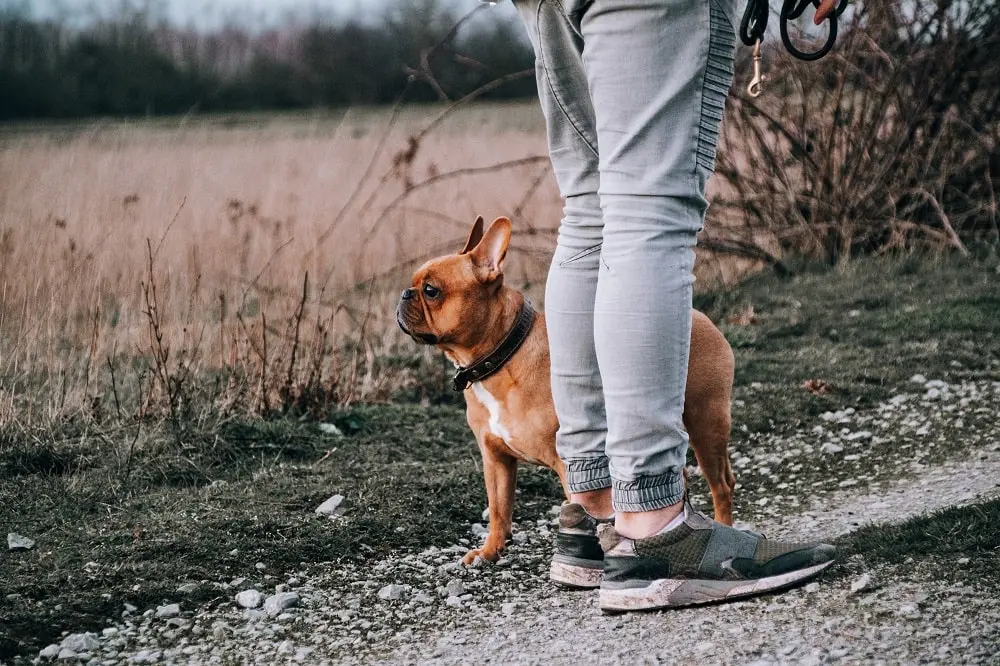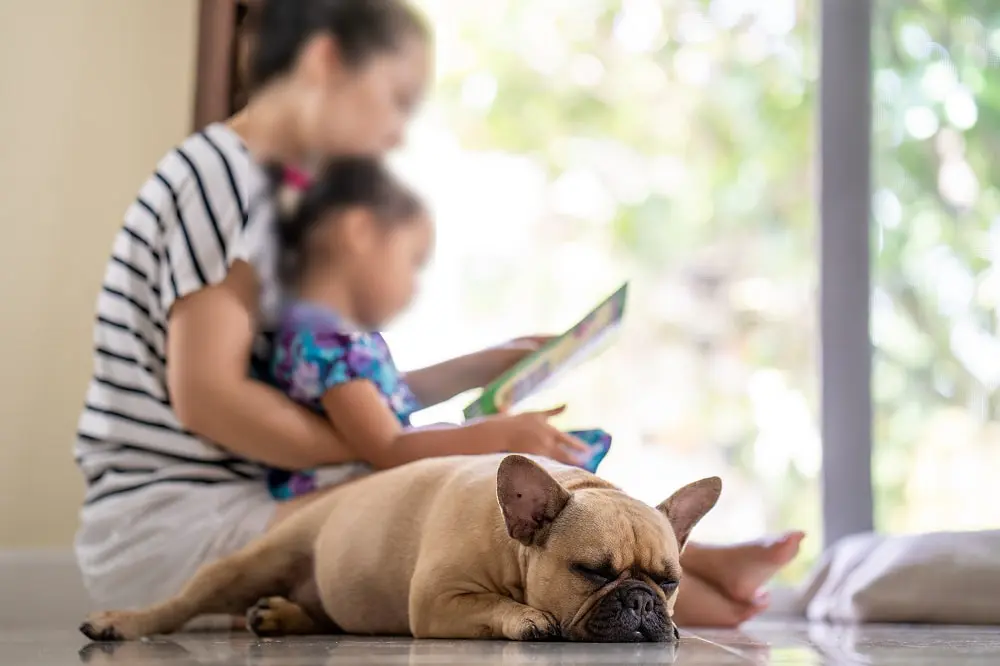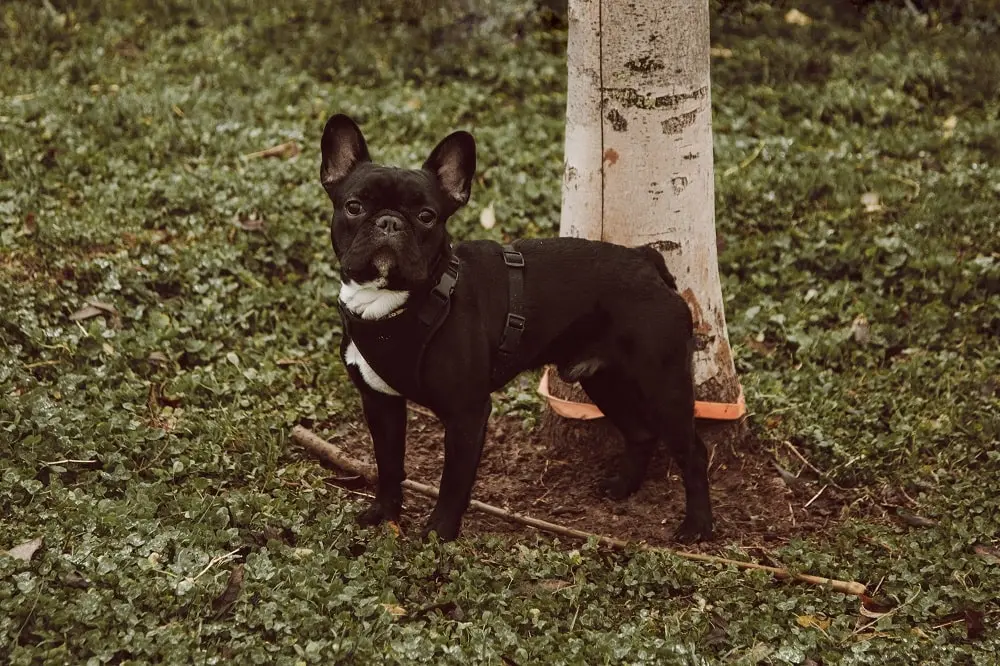Are French Bulldogs Good with Children?

Embarking on the journey of adding French Bulldog to your family is both exciting and thoughtful. If you’re considering a French Bulldog, you might wonder, “Are French Bulldogs good with children?”
“Absolutely! French Bulldogs are known for their gentle nature, making them wonderful companions for children. Their friendly demeanor and adaptability create a perfect match for family life.”
In this comprehensive guide, we delve into the temperament, characteristics, and potential challenges of integrating French Bulldogs into a family with kids. Discover the delightful aspects that make French Bulldogs popular as family pets and gain insights into creating a harmonious and joyful environment for both these charming companions and your little ones.
Let’s explore the dynamics of this unique relationship and understand how French Bulldogs can become cherished members of a family with children.
Can French Bulldogs Live With Children?
Bringing a French Bulldog into a home filled with the laughter and energy of children can be a wonderful adventure. These lovable dogs, with their easygoing nature, often thrive in the midst of family chaos.
While they’re known for being affectionate companions, it’s important to approach the introduction thoughtfully. Take your time letting the Frenchie get to know the little ones, teach the kids to be gentle and respectful, and sprinkle in some fun training sessions.
With a bit of patience and love, the bond between French Bulldogs and children can blossom into a heartwarming connection that enriches family life.
Why Frenchies Are Good for Children

French Bulldogs Exhibit a Laid-Back and Amiable Temperament
In the realm of canine companionship, French Bulldogs stand out for their distinctive blend of calmness and amiability. These charming canines exude a laid-back temperament that creates a serene environment, perfectly suited for the dynamic nature of family life.
Children find in them not just pets but gentle companions who navigate the daily hustle with ease, bringing an air of tranquility to the household.
French Bulldogs Can Instill a Sense of Responsibility in Children
Owning a French Bulldog becomes a valuable lesson in responsibility for children. Caring for these four-legged friends requires a routine of feeding, walks, and general well-being considerations.
This daily commitment instills a sense of accountability in youngsters, teaching them the importance of caring for others and fostering a strong sense of empathy that extends beyond the furry realm.
French Bulldogs Make Excellent Playmates for Your Child
Children revel in the joy of play, and French Bulldogs seamlessly integrate into this world of childhood delight. With boundless energy and an innate playfulness, these dogs become more than just pets; they transform into lively playmates.
From interactive games to outdoor adventures, Frenchies contribute to a child’s happiness, creating memories that last a lifetime.
French Bulldogs Are Not Excessive Barkers and Are Not Intimidating
The moderate nature of French Bulldogs extends to their vocal tendencies. Unlike some breeds that may be overwhelmed with excessive barking, Frenchies strike a balance, ensuring a peaceful coexistence within the home.
Furthermore, their compact size and friendly disposition eliminate any intimidation factor, fostering a comfortable environment for children to engage and form bonds without fear.
French Bulldogs Contribute to Keeping Children Active and Fit
Encouraging a healthy and active lifestyle is effortless in the presence of a French Bulldog. These spirited companions eagerly join children in outdoor activities, walks, and playful exercises.
The shared moments of physical engagement not only strengthen the bond between the child and their furry friend but also promote overall well-being, ensuring both stay active and fit.
French Bulldogs Can Play a Role in Alleviating Anxiety
Beyond their playful exterior, French Bulldogs harbors a unique ability to provide emotional support. This quality becomes particularly significant in the context of alleviating anxiety in children.
The intuitive nature of Frenchies allows them to sense and respond to emotional cues, offering a comforting presence during moments of stress or unease and becoming reliable allies in emotional well-being.
Potential Challenges: French Bulldogs and Children

Choosing a French Bulldog as a family companion is a delightful decision, yet it’s essential to consider potential hurdles that may arise when these charming dogs interact with children.
French Bulldogs May Exhibit Small French Bulldog Syndrome
Despite their friendly nature, some French Bulldogs might develop what is colloquially known as “small French Bulldog syndrome.” This can manifest as assertiveness or stubbornness.
It’s important for pet parents to recognize these tendencies early on and address them through consistent training and positive reinforcement. Understanding and managing this syndrome can ensure a smooth and enjoyable relationship between your Frenchie and the little ones at home.
Some French Bulldogs Might Display Excessive Protectiveness
While a protective instinct is commendable, some French Bulldogs may take it to the extreme, especially in households with children. Overly protective behavior can lead to challenges if not managed properly.
It calls for patient training and socialization to strike a balance between a vigilant guardian and a calm, well-behaved companion. Guiding your Frenchie helps maintain a positive protective instinct without causing disruptions in the family dynamic.
How to Train Frenchies For Children

Preparing Children for Frenchies
When bringing a French Bulldog into the family fold, it’s not just about teaching the Frenchie the ropes it’s also about getting the kids on board. Start by sharing the unique qualities of French Bulldogs, emphasizing their friendly nature and compact size.
Help the children understand that gentle interactions and respecting the Frenchie’s space create a positive atmosphere for everyone.
Socializing Your Frenchie with Children
Introducing your Frenchie to the chaotic joy of kids requires a gradual and positive approach. Expose your furry friend to various scenarios, letting them get used to the unpredictable energy of children.
Encourage controlled interactions, ensuring that both the Frenchie and the kids feel comfortable and safe. This socialization process sets the stage for a well-adjusted and sociable pet that thrives in the bustling family environment.
Obedience Training is Essential
Creating a well-behaved and safe environment involves obedience training for your French Bulldog. Teach fundamental commands like sit, stay, and come, not only for the dog’s behavior but also to ensure the children’s safety.
Consistent training establishes clear boundaries, providing structure for both the Frenchie and the kids. Positive reinforcement, such as treats and praise, not only enhances the learning experience but also strengthens the bond between your Frenchie and the little ones.
Will My French Bulldog Like Children?

The compatibility between French Bulldogs and children often hinges on individual temperament, socialization, and positive interactions. French Bulldogs are generally known for their affectionate and sociable nature, making them well-suited for family life.
If introduced to children in a gentle and positive manner, Frenchies often form strong bonds with the younger members of the family. Their patient demeanor and love for companionship make them excellent playmates, and their small size makes them manageable for children.
However, it’s crucial to supervise interactions, teach children how to approach and handle the dog respectfully, and monitor the Frenchie’s comfort level. With proper introduction and guidance, many French Bulldogs thrive in the company of children, creating lasting bonds filled with joy and affection.
French Bulldogs and Children are a Good Match
French Bulldogs and children? Now, that’s a match made in joyous companionship. These charming canines effortlessly blend into the chaos and laughter of family life. With their friendly demeanor and just-right size, Frenchies become more than pets they become cherished playmates for little ones.
Their easygoing nature makes them patient partners in the adventures of childhood, creating a bond that goes beyond the usual pet relationship. The shared moments of laughter and affection between French Bulldogs and children turn a house into a home filled with warmth and lifelong memories. It’s this magical connection that makes French Bulldogs the perfect addition to families with children.
Should I Let My Frenchie and Children Play Together?

Allowing your French Bulldog and children to engage in play together can be a rewarding and heartwarming experience, fostering a bond that often lasts a lifetime. Frenchies, with their amiable nature, are generally well-suited for playful interactions with kids.
However, cautious supervision is paramount to ensure the safety and comfort of both parties. It’s advisable to teach children the importance of gentle and respectful behavior towards their furry friend. Introducing positive reinforcement and creating a conducive environment for play, such as providing appropriate toys, contributes to a positive experience.
By observing their interactions, you can gauge the comfort levels of both the French Bulldog and the children, ensuring that playtime remains a source of joy and mutual affection for all involved.
Do French Bulldogs Like Other Children?
French Bulldogs, renowned for their sociable nature, often exhibit a welcoming attitude towards children, not limiting their affections to a single family. These amiable canines thrive in social settings and are generally open to forming bonds with other children.
Their adaptable and friendly demeanor, coupled with a natural playfulness, makes French Bulldogs well-suited for interactions with kids beyond their immediate circle. As an expert on the subject, I encourage families to foster socialization opportunities, allowing French Bulldogs to extend their charm and companionship to a broader spectrum of children, creating a positive and inclusive environment for everyone involved.
How Can I Make Sure My French Bulldog is Good With Children?

Building a positive bond between your French Bulldog and children requires patience, training, and intentional interactions. Begin with early socialization and consistent obedience training. Teach children to interact gently and set boundaries, emphasizing positive reinforcement.
Supervised playtimes foster bonding and reinforce positive behavior. Prioritizing these aspects ensures a harmonious connection, allowing your French Bulldog to thrive in the company of children.
Are French Bulldogs Good With Babies?
Yes, French Bulldogs are generally good with babies. Known for their affectionate and gentle nature, they often form strong bonds with the youngest members of the family. Their calm demeanor and adaptability make them suitable companions for infants.
However, individual temperaments may vary, so it’s essential to monitor their interactions and provide proper supervision. Introducing positive reinforcement and gradual acclimatization can help ensure a harmonious relationship between French Bulldogs and babies.
Signs French Bulldog is Jealous of Babies

Welcoming a French Bulldog into a family with a newborn is a heartwarming experience, but understanding and addressing potential signs of jealousy is crucial for a harmonious environment.
Obsessive Attention-Seeking Behavior
One subtle sign of jealousy in French Bulldogs is an increase in attention-seeking behavior. If your Frenchie suddenly craves more affection, nudging or pawing persistently, it may indicate a longing for the attention they perceive the baby is receiving.
Possessive Behavior Towards Baby Items
Jealousy can manifest as possessiveness, especially towards items associated with the baby. If your French Bulldog becomes overly protective of baby toys, blankets, or even the baby itself, it’s essential to address this possessive behavior promptly.
Withdrawal and Avoidance
Contrary to seeking attention, some French Bulldogs may display withdrawal or avoidance behaviors when a baby is present. If your Frenchie becomes distant, avoids the baby, or withdraws from usual family activities, it could be a sign of jealousy or discomfort.
Changes in Eating Habits
Jealousy may also impact a Frenchie’s eating habits. Some dogs may eat less or even refuse food as a response to emotional stress. Monitoring your dog’s appetite and seeking veterinary advice if there are significant changes is important.
Vocalization and Restlessness
Jealousy might find expression in increased vocalization or restlessness. If your French Bulldog becomes noisier or more fidgety around the baby, it could be a way of seeking attention or expressing discontent.
Preparing Adult French Bulldogs for the Arrival of a Baby

Welcoming a baby into your home is a significant change, not only for the family but also for your beloved French Bulldog. Ensuring a smooth transition involves thoughtful preparation and consideration for both the Frenchie and the newest family member.
Introduce your French Bulldog to the baby gradually
The introduction between your French Bulldog and the baby should be gradual and supervised. Begin by allowing the Frenchie to sniff baby-related items, creating a positive association.
Gradually expose the dog to the baby’s presence, ensuring a calm and controlled environment. Reward the Frenchie for calm behavior, reinforcing the positive connection with the new family member.
Familiarize your Frenchie with your baby’s scent through positive interactions
To familiarize your French Bulldog with the baby’s scent, engage in positive interactions. Allow the Frenchie to sniff the baby’s blankets or clothing under supervision.
Use treats or affectionate praise to create a positive association between the baby’s scent and rewarding experiences. This helps Frenchie establish a comforting connection with the new family member.
Educate your baby or child on how to respect and interact safely with your French Bulldog
Teaching your child about respecting and interacting safely with the French Bulldog is crucial. Educate them on Frenchie’s boundaries and signals.
Emphasize the importance of gentle touch and appropriate play, fostering a relationship built on mutual respect. Supervise interactions between the child and the Frenchie to ensure a positive and safe dynamic.
Prioritize your baby’s safety above all else
While your French Bulldog is a cherished member of the family, prioritizing your baby’s safety is paramount. Never leave the baby and Frenchie unsupervised, especially during the initial stages of introduction.
Create designated spaces for both the dog and the baby, allowing for coexistence while maintaining a secure environment for everyone.
How to Train your French Bulldog to be Good with Babies?

Training your French Bulldog to be baby-friendly is a patient process. Start by letting them explore baby items with treats and praise. Gradually expose them to baby sounds, rewarding calm behavior.
Always supervise interactions for safety. This builds a warm and trusting bond between your Frenchie and the new addition to your family.
Why you Should Get a French Bulldog for your Babies?
Choosing a French Bulldog for your babies brings a unique charm and companionship. Their affectionate nature, moderate size, and calm temperament make them delightful and safe playmates.
With an easygoing disposition, French Bulldogs seamlessly blend into family dynamics, fostering a positive environment for your little ones. Their loving companionship adds joy to childhood, making them an excellent choice for families seeking a furry friend for their babies.
French Bulldogs are not good for allergy sufferers

While French Bulldogs are wonderful companions, it’s essential to note that they may not be the best choice for individuals with allergies.
Dander Production
French Bulldogs, like all dogs, produce dander, which can trigger allergic reactions in some individuals. While they are considered a hypoallergenic breed, no dog is entirely allergen-free.
Regular Grooming and Cleaning
To minimize allergic reactions, regular grooming and cleaning routines are necessary for French Bulldogs. This includes brushing their coat, cleaning their living areas, and maintaining good overall hygiene to reduce the presence of allergens.
Consultation with Allergists
Individuals with allergies should consult allergists before bringing a French Bulldog into their homes. Allergists can provide guidance on managing allergies and suggest strategies to minimize potential allergic reactions.
Frequently Asked Questions
-
French Bulldog Attacks Child:
- Incidents of aggression in French Bulldogs are rare but can occur. Understanding the individual dog’s temperament, proper training, and supervision are crucial to prevent any potential issues. Always consult with a professional trainer or behaviorist if you have concerns.
-
Are French Bulldogs Easy to Train?
- Yes, French Bulldogs are generally intelligent and eager to please, making them trainable. Consistent positive reinforcement, short sessions, and patience are key to successful training. Start early and focus on socialization to ensure a well-behaved Frenchie.
-
Are French Bulldogs Good with Cats?
- French Bulldogs can get along well with cats, especially if introduced properly and from a young age. However, individual personalities play a role. Monitor their interactions initially and ensure a gradual, supervised introduction to foster a positive relationship.
-
Are French Bulldogs Good with Other Dogs?
- French Bulldogs typically have an amicable nature, making them good companions for other dogs. Socialization is crucial, and introductions should be supervised. While individual temperament varies, with proper introductions, many French Bulldogs happily coexist with other canines.
Conclusion
In conclusion, the relationship between French Bulldogs and children can be a rewarding and positive experience with proper training, socialization, and supervision. Understanding the unique traits of both French Bulldogs and children is key to fostering a harmonious and enjoyable companionship that benefits both the furry friends and the family as a whole.
FURTHER READING
For information, we have a range of articles discussing the best food and nutrition options, for your French Bulldog as well as tips, on maintaining their health and providing proper care.




